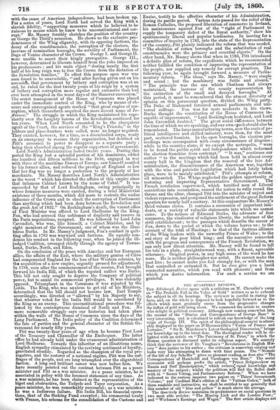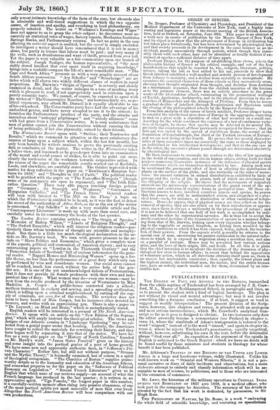THE QUARTERLY REVIEWS.
THE Edinburgh Review opens with a criticism on M. Chevalier's essay on "The Probable Fall in the Value of Gold" written so as to exhaust the subject in all its bearings. The reviewer is careful in stating his facts, and, on the whole is disposed to look hopefully forward as to the effects which must gradually ensue from the progressive changes the influx of gold will bring about. We commend the article to readers who delight in political economy. Although now coming somewhat late, the resume of the "Diaries and Correspondence of George Rose" is very interesting, and is calculated to refresh our knowledge of the long reign of George III. The spirit of the philosophical essayist is admir- ably displayed in the paper on DI llaussonville's " Union of France and Lorraine." " Sir R. Murchison's Latest Geological Discoveries," brings our knowledge up to the latest date. The theological reader will be de- lighted with an article on "The Patrimony of St. Peter," in which the Roman question is discussed under its religious aspect. We scarcely think that the reviewer of Dr. Vaughan's " Revolutions in English His- tory " does justice to his author ; the criticism is somewhat carping and looks very like attempting to damn with faint praise. The "Memoir of the life of Ary Scheffer " gives us pleasant reading, as does also "The Correspondence of Humboldt and Varnhagen von Ense." The social economist will perhaps prefer the article, " Prince Dolgoroukow on Russia and Serf Emancipation," which evinces: equal knowledge and mastery of the subject ; whilst the politic= will find the Ballot dealt with in " Secret Voting, and Parliamentary Reform." When we have indicated to the curious inquirer two papers on " Thiers' Seventeenth Volume," and Cardinal Mai's edition of the " Vatican Codex," both of them readable and instructive, we shall be entitled to say generally that this number of old " blue and yellow" is much above the average.
The Quarterly Review maintains its preeminence on social questions in two most able articles: "The Missing Link and the London Poor ; " and " Workmen's Earnings and Wages." The first article displays not
only a most intimate knowledge of the facts of the case, but abounds also in admirable and well-timed suggestions in which the two opposite errors, of inaction and apathy, and overdoing in loud philanthropy, are properly rebuked. The writer on " Workmen's Earnings and Wages" does not appear to us to grasp the whole subject ; he discourses most ac- curately on statistical rates of wages, factory reports, Mechanics Institutes Savings Banks, and Parliamentary. returns. In fact no point in the case affecting its material aspect is omitted, but the moral is simply excluded. So intelligent a writer should have remembered that it is not in money alone, but partly in leisure that labour must be paid ; and very many of the evils, such as drunkenness and want of thrift, proceed from over toil. Yet the paper is very valuable as a fair commentary upon one branch of the subject. Joseph Scaliger, the human representative, of "the most richly stored intellect that ever spent itself in acquiring knowledge," brings into a readable compass the life of a most remarkable man. " The Cape and South Africa " presents us with a very graphic account of our South African possessions. "Ary Scheffer" and "Stonehenge" are ar- tides which will charm two widely different classes of readers in equal proportions. Mr. Darwin's "Origin of Species" is severely and closely examined in detail, and the writer indulges in a tone of mocking irony which is pleasant to read, if not appropriately used in criticism upon a purely scientific topic. We cannot, of course, be expected to agree with the writer of " The Conservative Reaction," nor however fairly we, as po- litical opponents, may attack Mr. Disraeli is it equally allowable to one of his own school. The Conservative party have had the advantage of his undoubted genius, and have never scrupled to use it to the utmost; he furnishes the Parliamentary intellect of the party, and the attacks and inuendoes about "unhappy pilgrimages" and "unholy alliances" come with bad grace from a Conservative writer. It is very unfortunate that men of genius cannot join the Conservatives without running the risk of being politically, if not also physically, ruined by their friends.
The Westminster Revied, opens with " Strikes ; their Tendencies and Results," which we commend to attention as the most satisfactory dis- cussion at large upon a subject which, within the last few months, has only been handled by writers anxious to prove the previously existing data as conclusive on the matter. The writer in the Westminster takes a bolder view, and inasmuch as he goes deeper down into an examination of the moral and social causes of strikes, he is able to point out more dearly the tendencies of the workmen towards cooperative action. In the course of the paper the remarkable results worked out at Rochdale, Leeds, and elsewhere, are carefully stated. The thinker is provided with matter for deep reflection in the paper on " Rawlinson's Bampton Lec- tures for 1859," and " Thoughts in Aid of Faith." The political reader will be gratified with the paper on. "The Post-office Monopoly" (though some of its statements are open to argument), and " The Irish Edu- cation Question." Three very able papers touching foreign politics are " Germany ; its Strength and Weakness," " Grievances of Hungarian Catholics," and "The French Press." General readers will turn with interest to " The Mill on the Floss," a topic on which the Westminsteris entitled to be heard, as it was the first to detect the secret of the authorship of Adam Bede, so far as the sex of the writer is concerned. "Ary Scheffer" is also a very readable article and the " Contemporary Literature" is made up with more than usual care, and carefully notes in its commentary the books of the last quarter. The London Review contains articles on " The Origin of Species," " Memoirs of Bishop Wilson," " Limits of Religious Thought," and " The Oxford Fssayists," which will interest the religious reader—par- ticularly those whose tendencies of thought are scientific and metaphy- sical. But there is a little too much theological declamation in the ar- ticle on Mr. Darwin's book. We turn with greater pleasure to the ar- ticle on " Slave Politics and Economies," which gives a complete view of the aspects, political and economical, of American slavery ; and to very entertaining papers on "London in the Thirteenth Century" and the "Domestics Annals of Scotland," full of curious information for the gene- ral reader. " Ragged Homes and Ministering Women" opens up a fer- tile theme, no less than the performance of a great duty which only can be performed by wise and considerate women. Our social sores cannot all be reached, much less cured, without the active help of the gen- tler sex. It is one of the yet unacknowledged defects of Protestantism, that it does not provide its female professors with their own and inde- pendent line cf duty. What woman may do—even one woman—may be seen from the results produced by the invasion of Westminster by Miss Madeline A. Cooper : a public-house converted into a school ; mothers instructed in cookery and sewing, and a spreading civilization, which is telling upon a criminal neighbourhood, by cutting off the sup- ply of criminals, are some few of the results. The reviewer does not seem to have heard of Miss Cooper, but he instances other devoted la- bourers, and writes with an appreciating pen. There is also a paper on "Dr. Laycock ; on Mind and Brain," which is metaphysically tested. English readers will be interested in a perusal of The North American Review. It opens with an article on the "New Edition of the Septua- gint," which will amply instruct the theological scholar. The views and designs of our Atlantic cousins in "Landscape Gardening" may be col- lected from a genial paper under that heading. Latterly, the Americans have sought to collect the materials for rewriting their history, and they have begun well by separating it into that of the states. We have be- fore us a very able paper on the "History of North Carolina," founded on Mr. Hawk's work. "James Gates Percival" gives us the history and some insight into the poetical genius of a poet of home growth. We have some new and apparently authentic facts, in "Jefferson's Pri- vate Character." Rather late, but stall not without purpose, "Strauss and the Mythic Theory," is learnedly examined, but of course in a spirit of theological antagonism. " The Charities of Boston " supplies praise- worthy details as to the humanity and education of the American Athens, and somewhat prepares us for the paper on the "Influence of Political Economy on Legislation." "Recent French Literature" gives us in English that which none of our reviews supply—an account of what the French language has produced in the last quarter ; it is written in an appreciative spirit. " Ugo Foscolo," the longest paper in this number, is a carefully-written memoir often rising into pensive eloquence, of one of the most poetical spirits yet most miserable of men that ever lived. Altogether the North American Review will bear comparison with our owai productions.



























 Previous page
Previous page